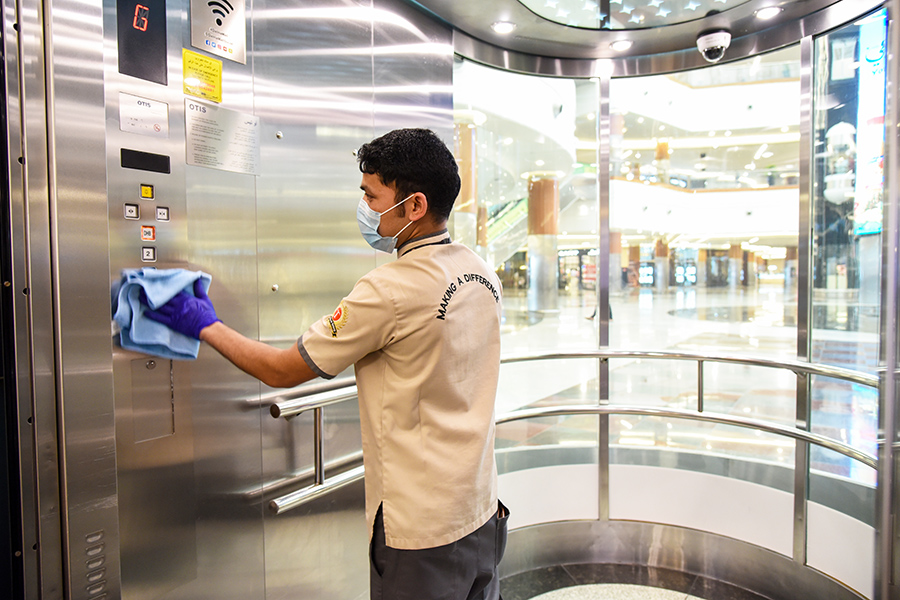
In response to the current crisis due to COVID-19, shopping malls in the Middle East are taking utmost caution to ensure community safety and customer happiness. Several properties have had to take the hard call to temporarily halt operations of certain sections of the malls to contain the spread of the coronavirus disease.
Abu Dhabi-based Dalma Mall – housing over 450 stores – has launched a public awareness campaign called “WE CARE” in order to spread the message of safety among its visitors. The mall has taken important safety measures by installing thermal scanners, multiple hand sanitising units and intensified cleaning process.
“Safeguarding the interest of all and to tackle the current scenario, we have installed thermal scanners while working closely with the Department of Culture and Tourism – Abu Dhabi. The frequency of cleaning has been beefed up and special briefing given to the staff to intensify cleaning procedures with use of additional layer of antibacterial disinfectants. We have also deployed over 150 hand sanitising units across the mall at key areas focusing all the potential contact surfaces like lifts, handrails, mall entrances, office door handles, trolley bays drop-off/pickup points etc. As a precautionary measure, we have increased the temperature inside the mall. We have also intensified the frequency of changing air filters. All the stores and employees have been advised on hygiene, health and safety measures like avoiding handshakes and contact etc,” shared Bhupinder Singh, general manager & CFO, Dalma Mall.
In a LinkedIn post, Fuad Sharaf, managing director, Majid Al Futtaim Properties highlighted the crucial importance of maintaining highest level of hygiene in public spaces like shopping malls. In its own shopping malls – including Mall of the Emirates, City Centres Deira, Mirdif, to name a few – Majid Al Futtaim is undertaking safety measures as outlined by the World Health Organisation (WHO) for its staff and visitors. These include frequent cleaning of the premises, especially surfaces, at the food courts, washrooms, prayer rooms, offices. From doors, handles and buttons to LED displays and ATMs, all surfaces are being sanitised frequently.
Meanwhile, Saudi Arabia-based Arabian Centres Company will temporarily close parts of its malls network, following directives of the Saudi Arabian government to safeguard its citizens and residents. Some of the essential mall offerings such as pharmacies and supermarkets will remain open potentially 24 hours depending on locations, and F&B outlets will continue to provide pick-up, delivery and drive-thru services. Other mall sections including entertainment and fashion retail will suspend activities until further notice.
“Our immediate attention is focused on the well-being of our customers and employees,” said Olivier Nougarou, CEO of Arabian Centres Company. “As a Saudi company, we are committed to providing every support we can to the local authorities and our government partners during this global pandemic. We are confident that this temporary partial closure will not have a permanent impact on our business or future plans, and we remain confident about the Saudi market.”
“Al Hokair’s stores will remain closed until such time as the government deems it prudent for retailers to recommence operations. Al Hokair Fashion Retail remains optimistic about the Saudi market and our businesses have a very strong financial position post recent refinancing. We are confident the temporary closure will not have a permanent impact on our operations,” added Marwan Moukarzel, CEO of Fawaz Al Hokair Fashion Retail. “At this moment in time, the safety of our employees, of our customers and of our local communities is our priority.”
Beyond the GCC, Iran has been one of the hardest hit countries affected by COVID-19. At a time when business picks up during Iranian New Year – between February 20 and March 20 – this year it has been a steady decline, literally destroying business and economic activities.
However, in such difficult time owners and managers of Iran’s shopping centres with the help and insight of Shahrokh Keshavarz, the regional representative of shopping centres in Iran, were able to start a campaign to support tenants in shopping centres. Keshavarz managed to convince more than 50 owners and managers of prominent shopping centres in Iran to help and support their tenants, also holding them to their social responsibility by allowing tenants to work rent-free for two-three months, or by substantially reducing their rent. The campaign has been successful in helping Iran’s retail industry to get through the current situation by curbing losses. While Iran is battling the coronavirus crisis, this campaign has been expanding throughout the country and attracting more and more shopping centres to the cause.